APAH African Art MCQ
1/40
There's no tags or description
Looks like no tags are added yet.
Name | Mastery | Learn | Test | Matching | Spaced | Call with Kai |
|---|
No study sessions yet.
41 Terms
Some scholars have indicated that leopard designs were included on the beaded Aka elephant mask from Cameroon for which of the following reasons?
To further advance the divine power of the Fon (king)
The combination of repeated patterns, vertical lines, and contrasting colors enabled the artist of the work shown to convey a sense of
dynamism and energy
Which of the following is a characteristic of the work shown that allows it to be attributed to the Edo peoples of Benin?
The beaded coral neck rings and crown, which were associated with the oba.
This sculpture from the Kingdom of Benin is made from
brass using the lost-wax technique
The artist who created the Benin bronze wall plaque from Oba's palace used which of the following techniques to show the importance of the Oba?
Hierarchical scale
The two works shown are similar in that they both present
idealized representations of a king
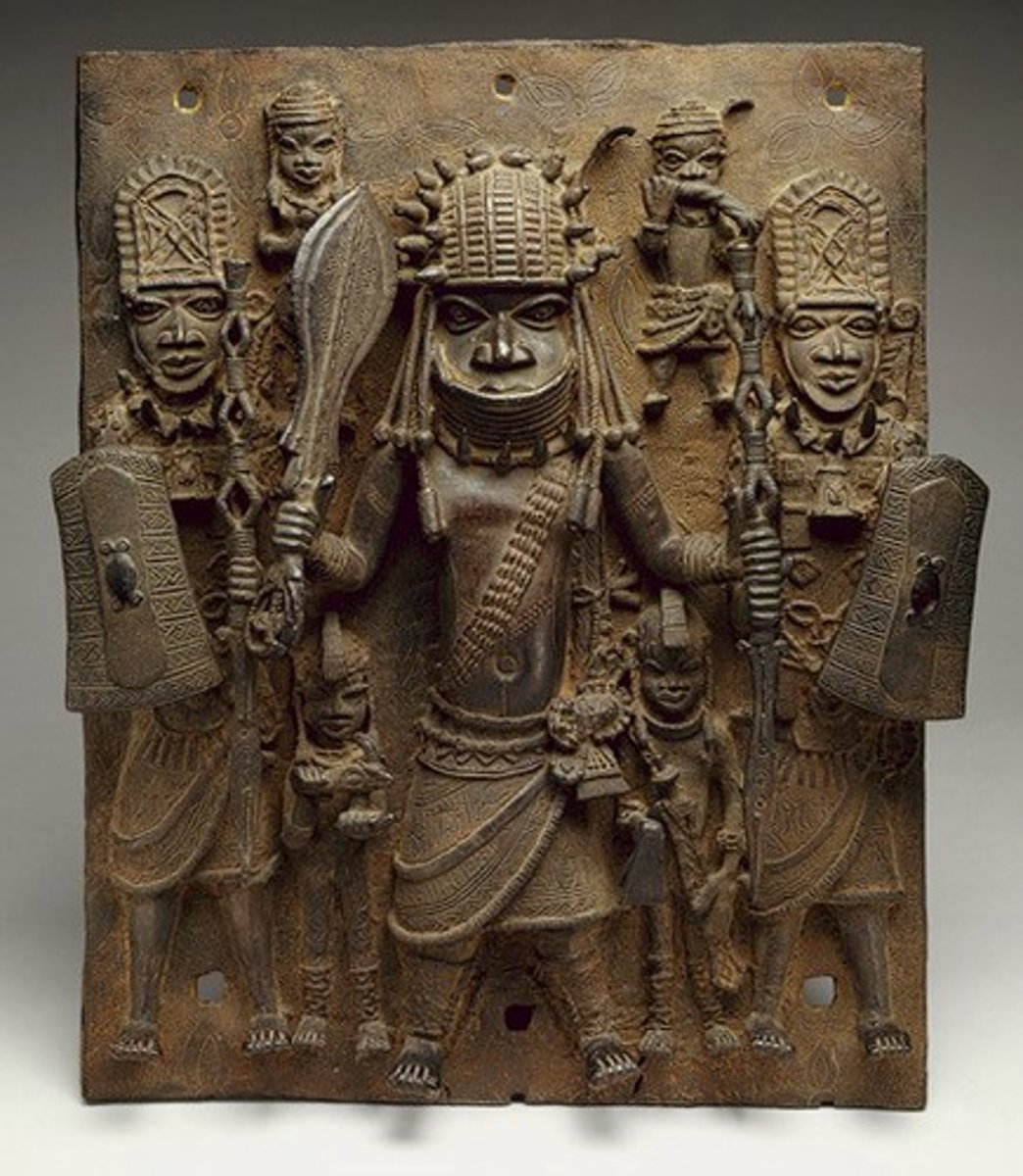
Which of the following statements explains why the plaque demonstrates continuity with Benin tradition?
It is part of a series that document the history of the obas.
The work shown was displayed
alongside a number of related works depicting similar figures
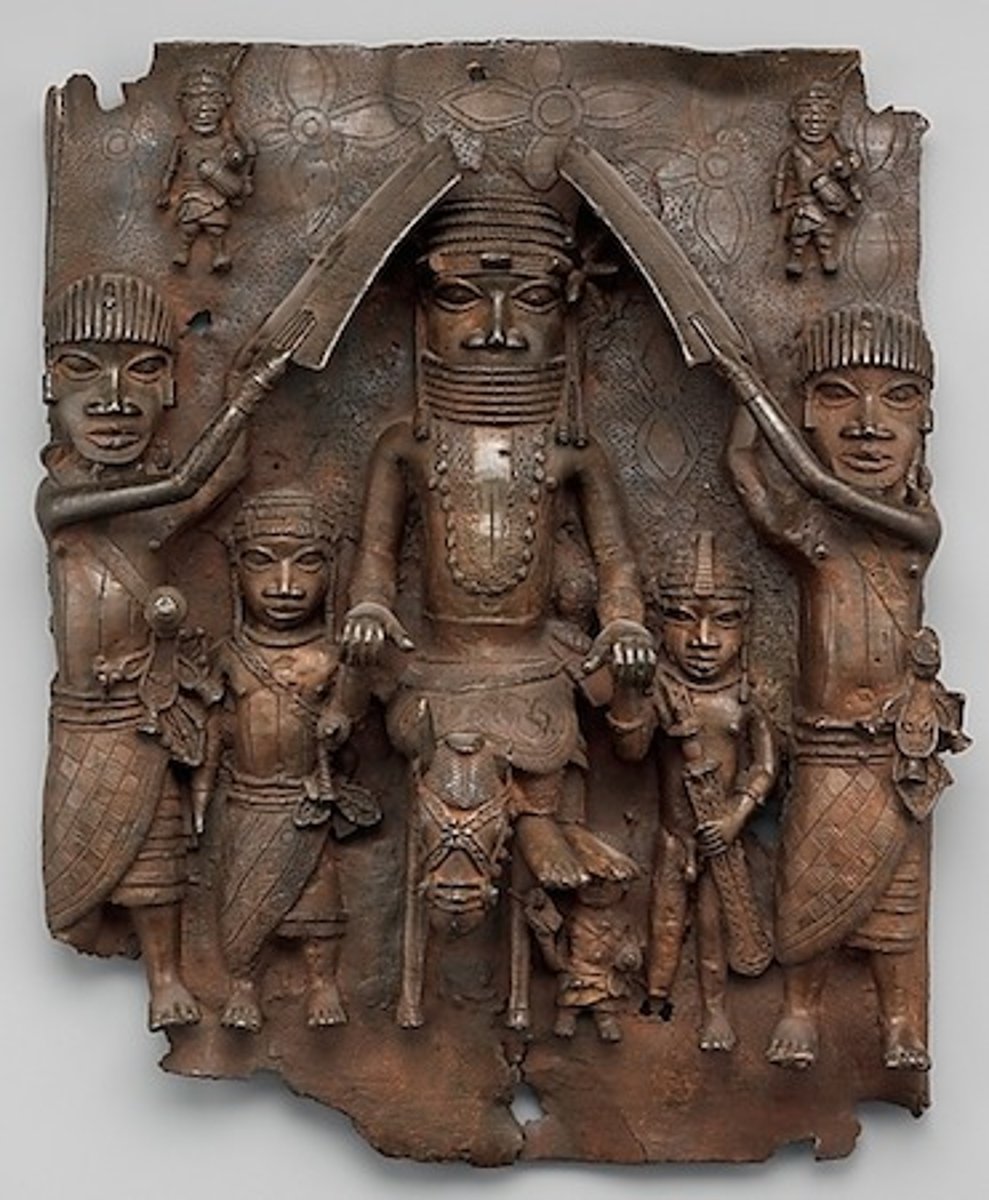
Access to the copper and tin needed to fabricate the brass wall plaque of the Oba's palace was made possible among the Edo peoples of Benin due to their
trade with Portuguese voyagers
The work shown can be attributed to which historic African kingdom?
Benin
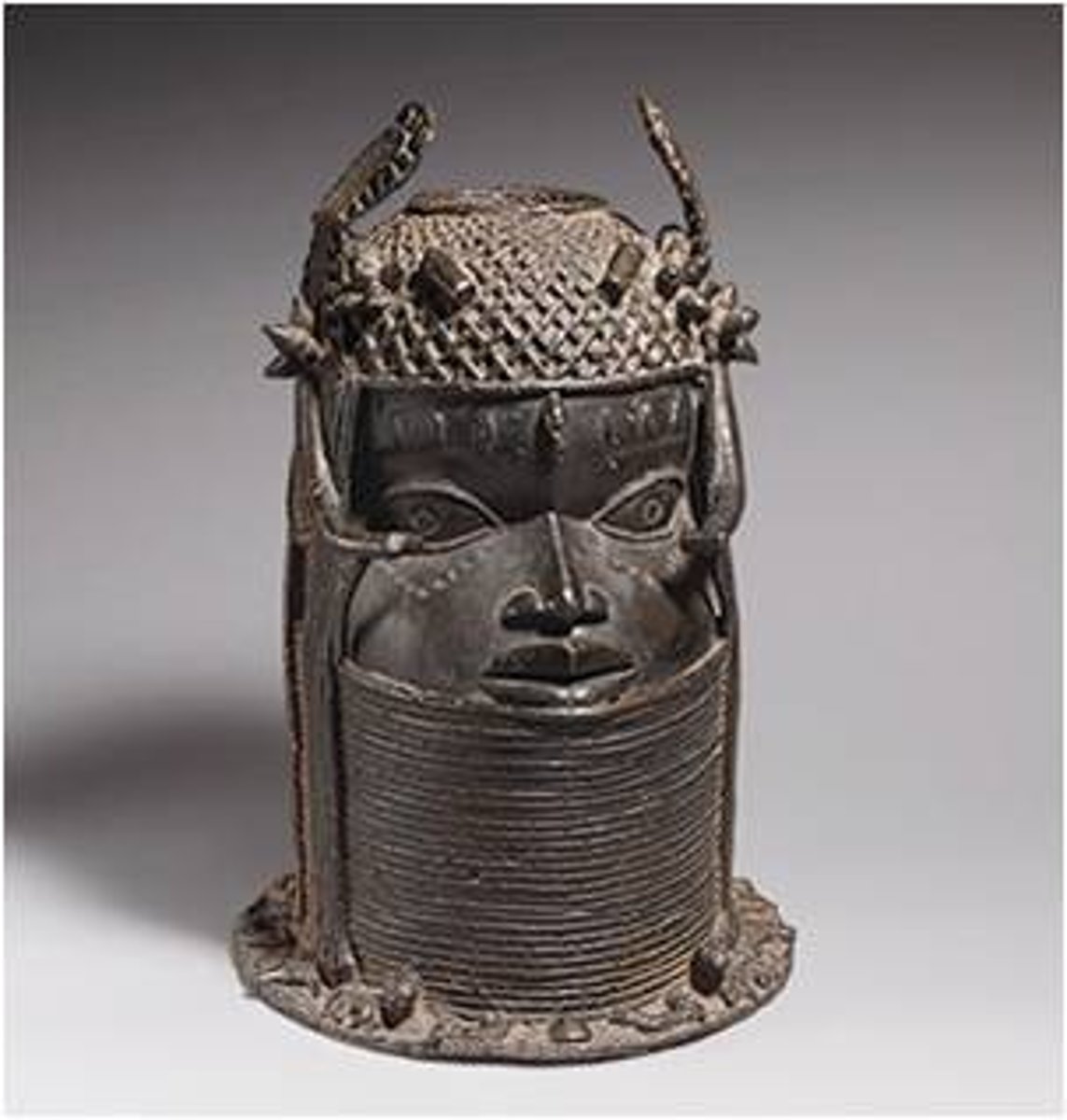
The wall plaque from Oba's palace shows continuity with other works created in the kingdom of Benin through its use of
lost-wax casting techniques using recycled brass
The sculptor of the wall plaque from Oba's palace unifies the composition by utilizing
similar facial features and incised textural patterns
Both the representation of the king's coral beads and the use of brass in the wall plaque from Oba's palace serve to communicate which of the following?
The wealth coming to the Benin Kingdom through trade with the Portuguese
This work can be attributed to
the Mende from West Africa
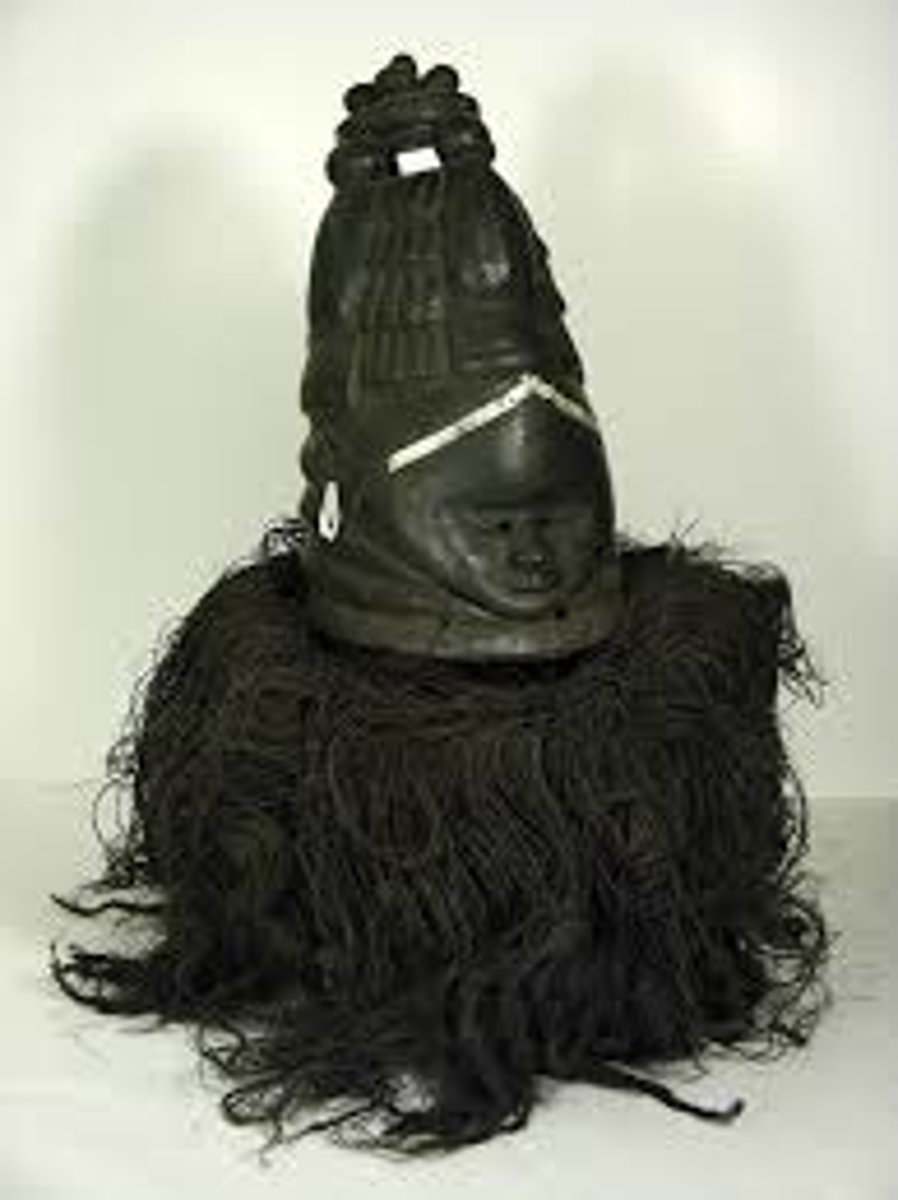
The work shown can be attributed to the Sande Society's Bundu mask tradition because of the
glossy black surface representing a woman's inner beauty
The audience witnessing Sande Society masquerades would have recognized the glossy black patina of the Bundu mask's surface as representing
the idealized beauty of smooth and glistening dark skin
In Mende culture, the Bundu mask, as a part of a masquerade ritual related to gender roles, is worn by the
female elders, who serve as teachers and mentors during the girls' initiation
Art historians interpret the neck rings on the Bundu mask shown as symbolizing
healthy body fat and the chrysalis of a moth
Fang byeri figures such as the work shown were intended to function as
talismans
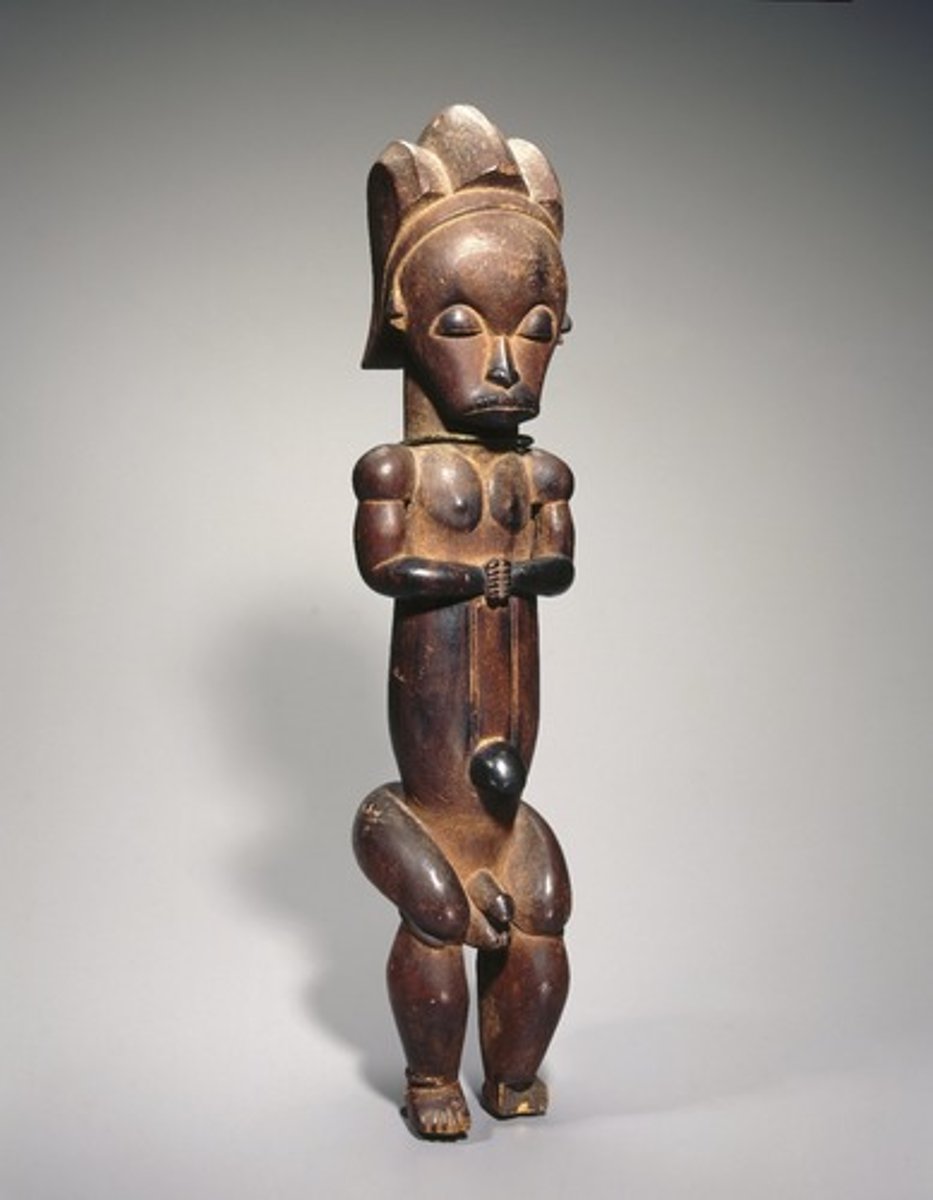
The Fang peoples of southern Cameroon sculpted byeri figures to guard containers holding their ancestors' relics, in part because the Fang
were historically a nomadic people and did not practice earthen burials
The Golden Stool (sika dwa kofi) of the Ashanti people must be presented on its side, resting on its own stool, to remind viewers that
the stool is sacred and no person may sit on it
The architect's choice to use primarily mud brick to build the Great Mosque of Djenné resulted in which of the following?
Softer exterior surfaces that needed periodic replastering
What purpose did the architect's inclusion of ostrich eggs serve at the Great Mosque of Djenné?
As a symbolic representation of fertility and purity
While the degree of naturalism varies in the Ikenga shrine figures used by the Igbo peoples, one traditional characteristic all Ikenga share is
horns rising above the head, intended to symbolize power
Ikenga figures, created by the Igbo peoples of Nigeria, are being interpreted as
symbols of the patron's past and future successes
The work shown fulfills which of the following functions?
It conveys a historical narrative.
Which of the following is a feature of the lukasa of the Luba peoples that is derived from the Luba tradition of oral, rather than written, history?
The lukasa had to be small enough for the person telling the history to hold comfortably.
In this Kuba sculpture of a king, the proportion of the head is exaggerated to show
the value place on intelligence in leaders
The Ndop portrait of King Mishe miShyaang maMbul demonstrates continuity within Kuba traditional sculpting conventions through its
rounded contours, facial expression, body position, and regalia
Which of the following visual features is intentionally included by artists to help the viewer to link a Ndop (portrait figure) with a specific named individual?
A geometric motif pattern sculpted on the front of the base
The power figure (Nkisi n'kondi) is inserted with pegs, nails, and other sharp objects in order to
solidify an oath or resolution
In designing the power figure (Nkisi n'kondi), the artist drew on the Kongo traditions of carving a hollow cavity in the area of the figure's belly in order to
serve as the figure's spiritual center, where medicinal material is placed
The sculpture was created by a
carver and a specialist combining elements of form and substance
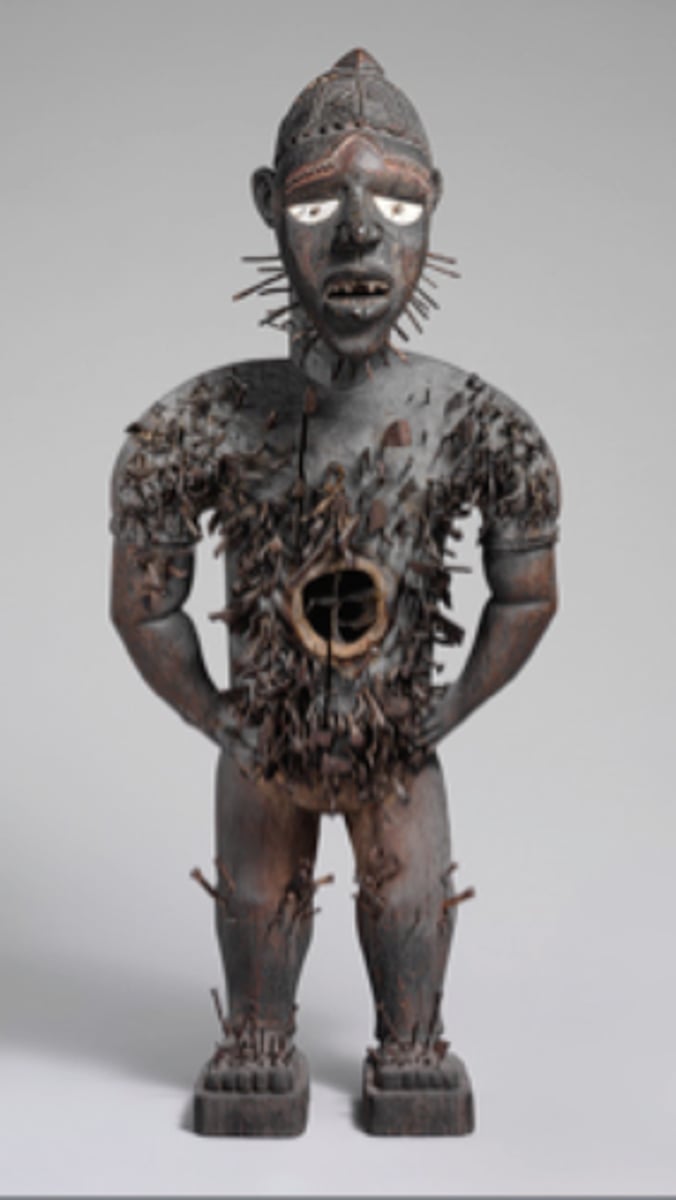
The nails and other materials added to the sculpture are intended to
activate the spiritual power residing in the figure
The work shown can be identified as
an Nkisi n'kondi power figure created by the Kongo peoples
The Chokwe Pwo mask is similar to the Mende Bundu mask in that both
celebrate the powers of womanhood
The female face in this Pwo mask from the Chokwe people is shown with closed eyes to represent the
empowerment of women through childbirth
Which of the following techniques and materials were used to create this work?
Carved wood
The stool shown can be attributed to Ashanti culture based on
its flat base, curved seat, and bilateral balance
In the veranda post of enthroned king and senior wife (Opo Ogoga), Olowe of Ise depicts the senior wife as a tall free-standing figure in order to
emphasize her strength and authority
In the veranda post of enthroned king and senior wife (Opo Ogoga) and the wall plaque, from Oba's palace, figural representation is incorporated that serves to
reinforce authority by depicting hierarchy